
|
|
Ludovicus Carbo: Dialogue on the acts and deeds of the august Prince and illustrious King of Hungary Matthias, written by Lodovicus Carbo and addressed to the same King
Budapest, Library of the Hungarian Academy of Sciences: K 397
One of them, Zsigmond Ernuszt was Bishop of the southern Hungarian town of Pécs (episcopus Quinqueecclesiensis) from 1473, the successor of the above mentioned Janus who had fallen out of the favour of the King because of the complot referred to in this dialogue. From 1494 he was also Ban of Dalmatia, Croatia and Sclavonia, and died in 1505. It can be well assumed that this work was written on his incentive, as he intended on the one hand to express his gratitude to the King for his appointment, and on the other hand to eulogize him by immortalizing his glorious deeds. The other collocutor, Ludovicus Carbo (or in Italian Lodovico Carbone) was born in Ferrara in 1435, and died in the same town in 1482. An Italian humanist writing in Latin, he was a fellow student of the gifted humanist poet and later bishop Janus Pannonius (1434-1472) in the famous school of Guarino Veronese in Ferrara. Carbo admired and envied Janus, and most probably they mutually could not bear each other. We can presume that Carbo happily undertook the job of writing this eulogy, partly in hope of the assumable rewards, partly in the expectation of an invitation to the Buda court. Still in the Ferrara years, Janus Pannonius had written an epigram on him, making a biting pun on his name: Ad Carbonem poetam:
(You, who are now Carbo, were an ember, isn’t it, Carbo himself wrote poems, as alluded to in the title of the above epigram. One of these was also included on fols 7v-8r of this codex: „Every poet should praise Hungary...” (Pannoniam debent cuncti celebrare poetae...) His merit was to have edited the speeches of Cicero as well as the epistles of the younger Pliny, and he also translated into Italian the letters and speeches of Cardinal Bessarion. A number of his festive addresses have been published in print. Although he was a fertile poet, nevertheless the quality of his poems was rather inferior: many of them have survived in various miscellanea of manuscripts in Italian libraries. Perhaps this was the reason of his envy in face of the exremely talented Janus Pannonius. And perhaps this was one more reason that stimulated him to write this work: to have his posthumous revenge on Janus who, after being celebrated throughout Europe, and appointed a bishop, finally fell out of the favour of King Matthias and died while fleeing from Hungary. The dialogue immediately starts with reprobatory references to the fugitive Bishop of Pécs, first anonymously, and later referred to by name several times. It follows with the praise of the virtues of Zsigmond and his father. Then this thread is continued by Zsigmond, who expresses his gratitude to his royal benefactor who „usually appreciates the faithful loyalty of his servants... rather than the glimmering of splendid attributes” – another side-stroke to Janus Pannonius. Zsigmond blames those that ungratefully fall away from the King, and presumes that Hungarian students acquire such factious principles in Italian schools. This is why Matthias, understandably, intended to prohibit young Hungarians from going to study in Italy. Carbo returns this argument with an acute ripost, giving the impression of a real discussion. Zsigmond then asks Carbo, his highly esteemed professor, to eulogize Matthias. During the rest of the dialogue, the questions and relations given in the mouth of Zsigmond all serve to glorify the King. We are informed about the pageship of Matthias’ father János Hunyadi, then about his battles and glorious victories; and also about the execution of Matthias’ brother László. János Hunyadi and his son Matthias are presented as defenders of the Christian world in face of the Turks. According to Carbo, these services lifted the father in the ranks of nobility. This kind of nobility, deserved by one’s own right, is accentuated several times in the work, as a proof for Carbo’s modern outlook. Perhaps he overemphasized this uprise by one’s own forces to such a degree that could be disgusting to Matthias. At all events, the King does not seem to have favoured Carbo. He certainly did not invite him to his Buda court. On the other side, Matthias was well aware both of the merits of the two disloyal bishops and of the talents of Janus Pannonius, for it was him to order the collection of the poems of the defunct Janus. It seems that Carbo overstepped the mark, and this fact perhaps also influenced the later fate of this codex.
Description of the codex: 184×128 mm, 40 folios, 80 pages, parchment, written with rotunda letters. Modest internal decoration. Fol. 1r has a typical Ferrarese white foliaged ornamental border, as well as a richly decorated C initial on polychromic and gilded fond. At the bottom of the page the coat of arms of Matthias is put on display, somewhat different from the usual. Page 4r has a white foliaged ornamental border on three sides, and a large, decorated and gilded A initial. The renowned British paleographer Albinia C. De la Mare, during her visit to Budapest in 1997, has examined this codex, and ascertained that it was copied by Nicolaus Mascatinus. She also identified the emendations on fols. 13r, 16v, 32v and 33v as being of the hand of Ludovicus Carbo.
Time of composition: The dialogue on King Matthias was presumably written by Carbo between 1473 and 1475. He already refers to the complot of Bishop János Vitéz (1472), but not yet to the planned marriage of Matthias and Beatrix of Aragon (1476). It must be an early representative of the Corvinian codexes also because it does not yet mention the famous library of Matthias that has preserved his name as a patron of arts. It was arguably written in 1473, shortly after the appointment of Zsigmond Ernuszt as Bishop of Pécs, as this latter was the patron of the book. Provenience: We do not know when this codex might have gone to Dalmatia (Split/Spalato) or Italy. — Handwritten note on fol. 3v: Fratris Ambrosii Cacicei (Kačić?) Spalatensis Predlis Gnalis (Generalis). 18th c. (?) – It was purchased by Count József Teleki, the first President of the Hungarian Academy of Sciences (unfortunately he does not tell where and from whom), and announced in his letter to the Academy, dated in Pozsony (Bratislava), on April 18, 1840, in which he declares that he wants “to open the assembly of the first week with the presentation of this treasure of erudition” (RAL 3/1840). Count József Teleki, who had offered his family library of 30 thousand volumes and thus laid the foundations of the Library of the Hungarian Academy of Sciences, had the augmentation of the Library at his heart, and enriched it by purchasing several invaluable volumes for it until his death. Par. 108. of the Protocols of May 25, 1840 of the weekly session of the Academy (preserved in the Library of the Academy, Inv. No. K 1393) include the decision on the Carbo codex: “We decided that this manuscript be reckoned in the Teleki Library, and be not lent without the permission of the Donator. Furthermore, the Assembly expresses its vivid gratitude for this highly esteemed Present, about which it will inform the General Assembly as well.”
This eulogy of King Matthias written by Carbo has survived in only one more copy, preserved in the Vatican Library (Vat.lat. 8618). This volume contains other works of Carbo as well. The dialogue between him and Bishop Zsigmond occupies fols. 123-163, thus its length is identical to the Corvinian codex. However, the Vatican codex is written on paper, while the Corvinian one on parchment. This is one more proof that this latter was dedicated to the King. In the present edition we publish the Corvinian codex of Carbo in the authoritative transcription of Jenő Ábel (1880) which corrects the errors of the first edition by Toldy, as well as in the patinated Hungarian translation of Gábor Kazinczy (1863). Jenő Ábel (1858-1889), professor of the Budapest University, was a renowned scholar of classical philology, a member of the Hungarian Academy, and an eminent researcher of Hungarian humanism (Corvincodexek 1879; Janus Pannonius életéhez és műveihez = EphK, 1879; Analecta monumentorum Hungariae historica. Pest, é.n.) Gábor Kazinczy (1818-1864), nephew of the founding father of Hungarian literary criticism, Ferenc Kazinczy, was also a friend of the eminent poet Mihály Vörösmarty and the critic Ferenc Toldy (first editor of Carbo’s codex). He wrote a number of poems, short stories, translations and essays. He was an excellent orator as well, as it is attested by a letter of the leading poet of the period, Sándor Petőfi (1823-1849). He was a leader of the reformer party in his county Zemplén, thus after the lost War of Independence against Austria (1848-49) his career was also broken. From 1853 he assisted Ferenc Toldy in publishing the works of the masters of Renaissance and Baroque Hungarian literature. He also translated a number of Molière’s comedies into Hungarian. Both Ábel’s Latin transcription and the Hungarian translation of Kazinczy were collated with their original by János Véber, research fellow of the Department of Manuscripts and Old Prints of the Library of the Hungarian Academy of Sciences, who also prepared the annotations illuminating the references to 15th-century Hungarian history. The Latin transcription was revised by Dr. Tamás Sajó, Director of the Studiolum Publisher, who also composed the annotations on the sources of the classical apophthegmata cited by Carbo, and prepared the English and Italian versions of this edition. The Spanish version of this edition was composed by Dr. Antonio Bernat Vistarini (Palma de Mallorca, Universitat de les Illes Balears), Co-Director of the Studiolum Publisher. The web edition of the Codex is the work of the Studiolum Publisher (www.studiolum.com).
Dr. Marianne Rozsondai Literature: |
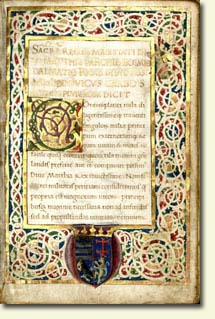
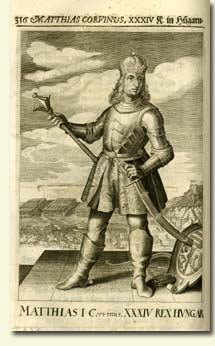
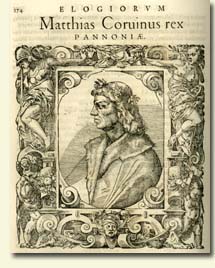
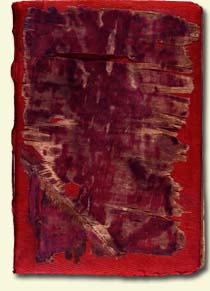
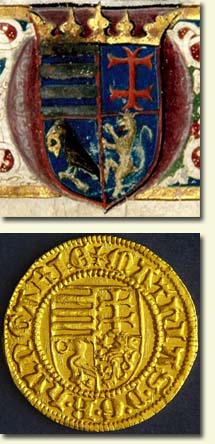 We have already
mentioned that the Corvinian coat of arms differs from the one usually to be
seen in the codices of King Matthias. We know that on the one hand the
collection of codices became more dynamic only in the last decade of Matthias’
reign, and on the other hand the coats of arms were also painted in the codices
as late as the second half of the 1480s. The Carbo codex belongs to the early
volumes of Matthias’ library, and the coat of arms painted on its first page is
identical to the one cast on his golden coins issued from his Körmöcbánya (today
Kremnica) mint in 1461-1462. These coins were certainly present in the 1460s in
Ferrara via the young Hungarians studying there. For as Carbo himself states:
“...nec aliunde plures flagrantissimi aurei ad manus nostras venerint, quam ex
beatissima Ungaria.” (7r) Such coin was therefore the model to the
coat of arms painted in this codex in the same city.
We have already
mentioned that the Corvinian coat of arms differs from the one usually to be
seen in the codices of King Matthias. We know that on the one hand the
collection of codices became more dynamic only in the last decade of Matthias’
reign, and on the other hand the coats of arms were also painted in the codices
as late as the second half of the 1480s. The Carbo codex belongs to the early
volumes of Matthias’ library, and the coat of arms painted on its first page is
identical to the one cast on his golden coins issued from his Körmöcbánya (today
Kremnica) mint in 1461-1462. These coins were certainly present in the 1460s in
Ferrara via the young Hungarians studying there. For as Carbo himself states:
“...nec aliunde plures flagrantissimi aurei ad manus nostras venerint, quam ex
beatissima Ungaria.” (7r) Such coin was therefore the model to the
coat of arms painted in this codex in the same city.